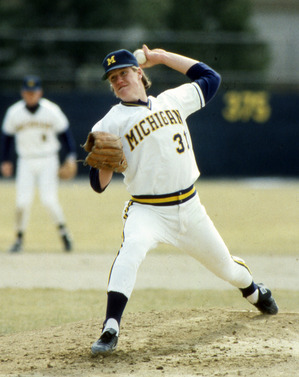Big Ten Network features former Michigan pitcher Jim Abbott as one of its top 50 conference athletes
Editor's note: The Big Ten Network is featuring its list of the top 50 Big Ten athletes. No. 36 is former Michigan pitcher Jim Abbott. The network's story, used with permission, follows.
BY DAN MCGRATH Big Ten Network Special Contributor
The first of Jim Abbott’s collegiate pitching victories at the University of Michigan may have been his most significant because of the statement it made about his capabilities.
Though he was born without a right hand, Abbott had the physical ability, the mental ingenuity and the intestinal fortitude to become a top-level athlete: a standout quarterback in football, a major league pitching prospect in baseball.

Jim Abbott pitches for Michigan in 1988.
File photo
He was on in relief for the Wolverines with a runner on third in a tie game against North Carolina in the spring of his freshman year. After Abbott’s first pitch, Carolina’s third-base coach ordered the runner to break for home, certain Abbott would not be able to throw home in time to retire him. Abbott, a picture of calm, executed a maneuver he’d been practicing most of his life: He removed the ball from the glove he wore on his left hand, slipped the glove under his right arm and made a strong, accurate throw with his left in plenty of time to nail the runner. Michigan scored in the bottom of the inning, rewarding Abbott with a win for the one pitch he had delivered ... and the statement he’d subsequently made.
“I don’t ever remember it being something I had to master,” Abbott said of the glove-to-hand transition that enabled him to become a capable fielder. “It was just something I did.”
“Just something I did” summed up Abbott’s approach to sports. There was no place in his life for self-pity, no thought of viewing himself as anything other than a committed athlete striving to be the best he could be.
“I could always throw, so baseball called to me,” he said. “I loved the Detroit Tigers growing up and dreamed of playing in Tiger Stadium. To be honest, though, it’s just the sport I was best at.”
Abbott played quarterback for a Flint Central team that reached the semifinal round of the Michigan state playoffs, but baseball was his ticket to Ann Arbor. Any hitter who stood in against him soon realized that the 6-foot-3, 210-pound Abbott was a hard-throwing, tough-minded left-hander, certainly no gimmick.
“In recruiting, I didn’t do any favors -- we were too competitive for that,” said Bud Middaugh, the Wolverines’ coach when Abbott played at Michigan. “I just hoped he’d be a competent college pitcher. He turned out far better than I imagined.”
Abbott went 26-8 for the Wolverines in his three varsity seasons, helping them to two Big Ten titles. His 26 wins are the fourth highest total in school history. His 3.04 career ERA is sixth best, and his 13 complete games rank eighth.
“Playing baseball for Michigan is one of my proudest accomplishments,” Abbott said. “My greatest memory could be the day I walked into the locker room and saw my jersey hanging in my locker.”
He wore it well. In 1987, Abbott won the Sullivan Award from the Amateur Athletic Union as the nation’s top amateur athlete, the first baseball player so honored. In 1988 he was the Big Ten Player of the Year, and won both the Golden Spikes Award as the nation’s top college player and the Jesse Owens Award as Big Ten male athlete of the year, the first baseball player to do so.
The bigger the stage, the better Abbott performed. Pitching for Team USA, he beat the Cuban National team in Cuba in 1987, the first American pitcher to do so in 25 years. He pitched a complete-game seven-hitter to defeat Japan 5-3 in the gold-medal game at the 1988 Olympics and was named top male athlete of the Seoul games.
Gimmick? The California Angels selected him in the first round of the 1988 amateur draft and he was in the major leagues the following spring, without spending a day in the minors.
“Coach Middaugh allowed me to pitch in important games early in my career, and that helped,” Abbott said. “The exposure to baseball at the Big Ten level and traveling nationally was a great way to prepare for the demands of pro baseball.”
Abbott won 87 games over 10 seasons with the Angels, the Yankees, the White Sox and the Brewers. His best season was 1991, when he went 18-11 with a 2.89 ERA for the Angels. He was the feel-good story of baseball in September 1993 when he pitched a no-hitter for the Yankees against Cleveland at Yankee Stadium, blanking an Indians lineup that featured Kenny Lofton, Carlos Baerga, Albert Belle, Manny Ramirez and Jim Thome. “The highlight of my career,” Abbott said. “Everywhere I go, people talk about that game, how exciting it was. That makes me very proud.”
He entered the College Baseball Hall of Fame in 2007. Michigan retired his No. 31 jersey in 2009. Pitching achievements aside, Abbott has been an inspiration for the way he has approached life, not just baseball. He lives in California and devotes his time to motivational speaking, as well as working with the federal government on projects involving disability issues and awareness.
“I have learned that it’s not the disability that defines you, it’s how you deal with the challenges the disability presents you with,” Abbott said. “We have an obligation to the abilities we do have. I have never felt slighted. The truth is, I have been incredibly blessed. More was given to me than was ever taken away.”


Comments
jameslucas
Thu, Sep 9, 2010 : 5:49 p.m.
tater, you are right he was a great baseball player, we were lucky to have Jim Abbott play for Michigan.